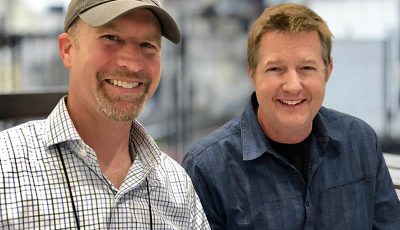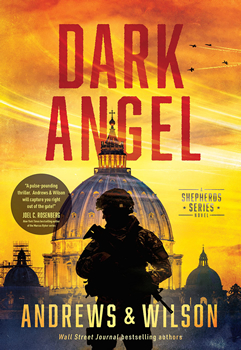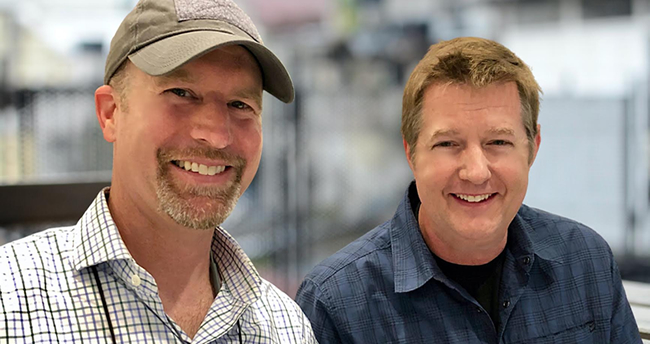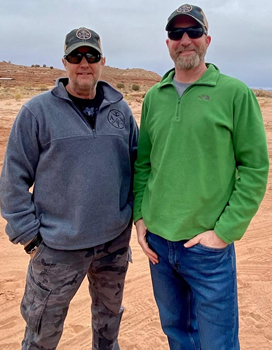

Up Close: Andrews and Wilson
Powerful Character Returns in Second Shepherds Book
 By Dawn Ius
By Dawn Ius
You don’t have to love military thrillers to know the names Jeffrey Wilson and Brian Andrews—though you’ve likely read a few books in their popular Tier One series. But in recent months, their names have been popping up everywhere as they continue their grind as one of the most prolific writing duos in the industry.
Their latest upcoming release is DARK ANGEL, Book 2 in their Shepherds series, which follows their powerful protagonist Jedidah Johnson. The book picks up where Dark Intercept left off as we follow Jed’s journey at the new Jericho training facility, where he learns to excel in spiritual and physical warfare.
Jed and the rest of the team will need it, as The Shepherds and The Dark Ones will go head to head in a religious war meant to instill hate around the world. The book, like the series, is gritty and unapologetic in the way it shares gospel with the mainstream world.
In this interview with The Big Thrill, the authors take time out of their chaotic schedule (not an exaggeration) to talk more about DARK ANGEL, time management, and a cornucopia of new projects from them heading your way. We’re tired just thinking about it!
It feels like just yesterday that this new series was announced, and here we are with Book 2, DARK ANGEL. With so many projects on the go, how did you settle back into the world of Jed and the Nashville setting?
BRIAN ANDREWS: You know, it’s funny, because we get asked that question a lot recently—about how we get into minds of our various characters and universes with multiple series. It’s definitely a logistical challenge getting three to four books out a year these days in a variety of different series, but settling into each of the worlds and characters is easier than you might think. It sounds a bit cliché, but that part is easy for us because the characters are so familiar to us. We feel like we know them as people. We could no more have trouble differentiating our characters than mix up our kids, if that makes sense.
JEFFREY WILSON: Well, for sure it’s quick, and we really want to thank Tyndale House for being invested enough in the series that they were willing to launch the first three books on such a tight schedule. The first three books will have all launched within just over a year—work for us but a tremendous amount of work for the production team. Yes, DARK ANGEL picks up where Dark Intercept left off, and we find Jed back in Nashville where he—and the reader—will be further read in on what the Shepherds organization is and the nature of their secret operations. But in typical Andrews and Wilson fashion, he’ll have to get up to speed quickly because there is a new, global threat on the rise that will require Jed and his team to be on top of their game.
This series includes a bit of the supernatural—which is outside of your usual work. It has the potential to be controversial—the whole idea of spiritual warfare, perhaps. Aside from a good read, which you always provide, what are you hoping readers take away from this book?
BA: Great question, and the answer might surprise you. We don’t feel that elements of faith and spiritual warfare are a big shift from what we already do. The core of our work has always been very character-driven stories about the struggles, sacrifices, and relationships of people who find themselves in difficult, if not seemingly impossible, situations. Because of this, I guess we feel that such questions about faith, spirituality, God, and good and evil are universal and a very natural part of the human condition. No matter where a person lands on the answers to the questions about God, his role in the universe and our lives, and the nature of good and evil, having the characters ask those questions and come to their own conclusions feels broadly relatable to us.
JW: Yeah, I totally agree with Brian on that. And adding the grounded supernatural elements into the story is absolutely invigorating. We’ve all experienced times in our lives when that little voice in our head gives seemingly preternatural guidance that turns out to be prescient. Turn right instead of left, walk instead of taking the subway today, pick up the phone and call your sibling because you have a feeling they need help…is that supernatural or some other unseen hand at work? Couple that with covert operations and traditional war-fighting tactics, and you have something that feels very interesting and compelling. Yes, it’s more speculative than Tier One or Sons of Valor or Rogue Asset, but it’s really exciting fodder for a writer, and we’re delighted at how well these elements have been received by the vast majority of our readers.
When preparing for an interview, I sometimes take a peek at reviews, and it’s fascinating to read things like “not my usual cup of tea” or “I don’t like supernatural, usually” — but then see how you sucked the reader in, and suddenly this is their cup of tea. Were you concerned as you conceived this series that you would lose some of the readers who follow your other books? Or were you hoping to attract a new fan base?
JW: I think before any of that, as storytellers, we were just excited about Jed’s journey as a character. Once we had our hero’s path mapped out, we definitely knew some existing readers might balk at the faith-elements and that spiritual warfare might not be their cup of tea, as you said. But we also knew that we would find new readers who were yearning for a series with these types of elements. As you noted, we did get a ton of reviews and also emails from readers who approached the first book skeptically, but then wound up really enjoying it. I think the key to that, again, is writing characters who engage the readers. If you bring the characters to life, then the readers will easily accept the more speculative elements.
BA: Jeff is absolutely right—getting the characters right sets the stage in stories with a more speculative or supernatural element as much or perhaps even more than our straight-up thrillers. You have to understand, we don’t view ourselves as military thriller novelists, but as storytellers. And we have a deep well of stories we want to tell—many of them crossing stereotypical boundaries that the industry fences off in particular genres. In addition to our Tier One and Sons of Valor series which we continue to write and love, the next couple of years will have releases in the techno-thriller genre, grounded sci-fi, and even more speculative thrillers much like The Shepherds. These new books will have the same character-driven stories, global stakes, and action we are known for, but also move beyond genre boundaries.
Were any of the characters in DARK ANGEL—or the series as a whole—inspired by any of the people in the Bible? And if so, how did that help—or hinder—your character development?
BA: The entire Shepherds series is inspired by Biblical stories of good versus evil. When we start a book or series, we always begin with a “what if” question. After that, we establish the rules and parameters for the universe we’re creating. So in the Shepherds series, we work very hard to structure our themes around both Old and New Testament treatments of good versus evil. Our lead character is very focused on trying to understand God’s role in his life. Moreover, he struggles understanding God’s role in a world where evil seems to have free rein to cause chaos and misery. It’s natural to ask questions like “How could a loving God let ‘xyz’ bad thing happen?” This is an important question, especially for those of us who believe in agency, free will, and the power of choice. That our choices have both merit and consequence is an important theme in the Shepherds series.
JW: Yes, that’s exactly right. And in terms of biblical inspiration for characters, the options feel limitless. One constant theme throughout the Bible, however, is the idea of God using flawed men and women for his work. King David fell more than once from God’s purpose. Peter Denies Christ three times. Jonah refused to do what God asked and paid the price. Before he became Paul, who wrote more than half of the New Testament, Saul hunted down early Christians. The point is, the Bible is full of characters who try, fail, and then have to pick themselves up and re-enter the arena. In Jedidiah Johnson, we have this character who, at the opening of Dark Intercept is broken physically, psychologically, and spiritually. Here is a man who, when confronted by true evil in his youth, ran. Not only did he run from evil, he ran from his faith, his family, his friends, and the future he’d planned for himself. Yet later, he finds that even his bad decisions allowed him to become someone that God can eventually use, despite his flaws, for His purpose. In that way, Jed is almost the “everyman” for a myriad of Bible stories.
What was the hardest part about writing the second book in this series?
JW: (laughs) Scheduling the time. All kidding aside, we obviously have challenges with time these days, producing a number of books a year now, every year, as well as the various film and television projects we’re blessed to be involved with. The joy, though, is once we do sit down at the computer and start to write, we get transported into new, exciting, other worlds. Ironically, writing is the antidote for all the stress created by the schedule.
BA: As it turns out, Book One in the series (Dark Intercept) almost serves as a prologue to Books Two and Three. I wish I could say this was by design, but the truth is that notion didn’t occur to us until we were writing DARK ANGEL and struggling to find our footing. The challenge was trying to figure out how to take an experienced operator like Jed—someone with 15 years of service—and make him feel like a rookie again. We needed to put him in an environment where he’d be surrounded by other experienced operator characters who all needed to bond and trust each other. Ultimately, we decided that Jed and his team needed to go through “basic training” together, which is how the book opens. The reader goes along with Jed on this journey and experience, and that’s how we learn about the inner workings of the Shepherds program.
I’m excited that the series has been optioned for TV. What can you share about how development is going so far?
BA: We’re thrilled as well. Right now, the producers are working to attach screenwriters and a director. After that, the series will be shopped for a streaming platform, and that’s when we hope to make the big announcement. Until then, fingers crossed!
This series is only one of several series on the go for you—honestly, I’m exhausted thinking about your schedule. What can you share about your upcoming projects—including, hopefully, the third book in this series?
JW: Yeah, we have a lot going on. The third book in the Shepherds series, Dark Fall, comes out this autumn. We’re also delighted to report that we have signed another three-book deal with Tyndale to continue the series, so look for Books Four to Six coming in winter 2024, 25, and 26. Our second book in the Sons of Valor series, Violence of Action, drops June 7th from Blackstone, and we think fans will love where Chunk and the team go next in that story. The third book is slated for June of 2024.
Also, Tier One is back! Book #7 Dempsey, releases in February 2023, and a lot of hanging questions from the previous two books will be answered. We also have the first book in our series of techno-thrillers, Sandbox, coming out fall of 2023, and we’re really excited about this one. What am I missing, Brian?
BA: Well, we’re working with Blackstone to broaden our storytelling into other forms of media. While we can’t share the details yet, we have signed a deal to bring another of our speculative thrillers to the big screen, so look for both the book and the film announcements soon. We have several other media projects in development as well, all tied to books in various stages of production. Besides the Shepherds streaming series, we have another TV series we’re super excited about in the early stages of development. Sorry to be vague, but until the studios make the announcements, our hands are tied.
Speaking of productivity, a lot of writers struggled with productivity through the pandemic. And while it’s not fully over yet, there is some light at the end of the tunnel. What advice would you give to writers on how to get back at it after a perhaps prolonged absence from the craft?
BA: To quote the iconic and prolific Stephen King, “A writer writes.” There is no shortcut around carving out the time, sitting at your computer, and making your fingers move. Starting is hard, but once you start, the story sweeps you up in its undertow. I like to use the swimming laps metaphor for writing—getting the cold pool and swimming that first few laps is the hardest part. But once you get moving, you find a groove and go.
JW: I completely agree. And remember—perfect is the enemy of good. Step one is to get the story out on paper. The goal is to write, not write perfect. Every amazing story is a work in progress until it’s complete. The heavy lift happens in the editing phase, so give yourself the freedom to write the rough without constraints.
I feel like anyone who has read The Big Thrill knows a lot about the two of you—you’re a staple in our publication and two of the most generous and nice guys in the genre. What can you share that readers might not already know about you?
That we have our ups and downs just like everybody else. That we sometimes have to step away from a series we love (like we did with Beijing Red) or take a break from a series (like we did with Tier One for two years) because of things beyond our control or emergent obligations. We’ve changed publishers. We’ve changed editors. We’ve changed strategic directions several times. From the outside, it might seem like we have a crystal ball, but we don’t. Like everyone else in this hyper competitive business, we often feel like we’re forging our way ahead in the dark. But through it all, the friendships we’ve forged and the relationships we’ve made with folks like you and The Big Thrill, ITW, our agent, fellow veterans, and other authors have kept us buoyant and energized. The writing community has been there for us to offer a helping hand, new connections, and words of encouragement every step of the journey. We have not achieved our success in a vacuum, which is why we try to always pay it forward. So thank you for noticing our efforts, but to use a military term, what we really want to do is thank you for always having our six!
- Africa Scene: Iris Mwanza by Michael Sears - December 16, 2024
- Late Checkout by Alan Orloff (VIDEO) - December 11, 2024
- Jack Stewart with Millie Naylor Hast (VIDEO) - December 11, 2024



